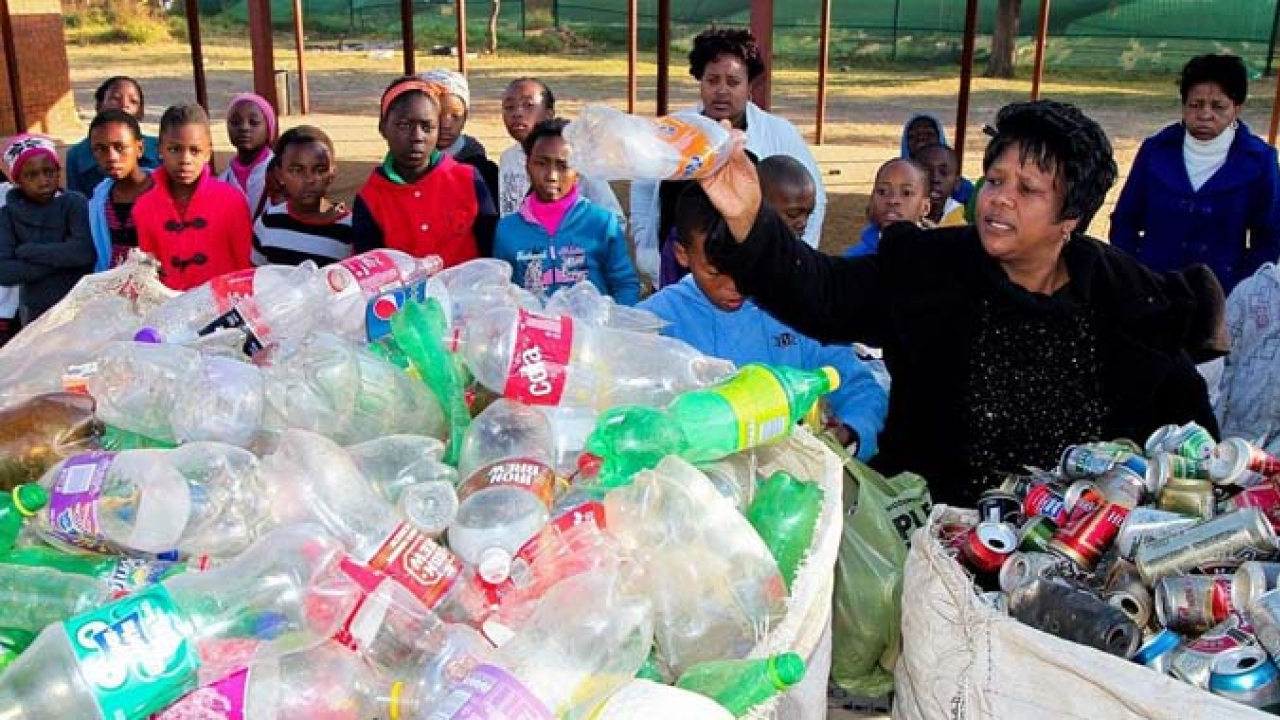Recycling in Africa
Africa’s inappropriate waste management is causing economic, social and environmental problems. However, there are some positive signs, writes L&L’s Africa correspondent.

Africa currently recycles only 4 percent of its waste – a far cry from the African Union’s vision of its cities recycling at least 50 percent of generated waste by 2023. Consider this against the fact that some 70-80 percent of Municipal Solid Waste (MSW) is thought to be recyclable.
The reality is that some 90 percent of Africa’s waste is disposed of at uncontrolled dumpsites and landfills, often with associated open burning.
This discouraging scenario first came to light when the UN’s Environment Program and South Africa’s Council for Scientific & Industrial Research published an initial Africa Waste Management Outlook that reported on the state of waste management in Africa. The researchers declared that Africa’s first priority was to address public health imperatives by ensuring that all citizens have access to proper waste management services. Comprehensive, reliable and regular city cleansing and controlled waste disposal is the foundation of any integrated waste management system.
The second priority was harnessing waste as a resource – unlocking socio-economic opportunities by moving waste up the management hierarchy, away from disposal and towards prevention, reuse, recovery and recycling.
Against the minuscule recycling rate across the continent, South Africa stands out as a leading light. In 2021, South Africa consumed approximately 3.4 million tons of packaging (glass, paper, metal and plastic), of which approximately 54 percent was collected for recycling, compared to the 4 percent continental average. Apart from South Africa’s success story, the situation remains gloomy: collection services in most African countries are woefully inadequate. The average MSW collection rate is paltry (mostly organic waste), and the bulk of which is dumped but could provide significant socio-economic opportunities.
Across Africa, recycling is emerging as a viable enterprise, driven more by poverty, unemployment and socio-economic need than by public or private sector design.
An army of informal waste-pickers makes a living by recovering valuable resources at little to no cost to municipalities or private companies.
So, it’s not all negative news: here are some bright spots.
Recycling challenge to Africa’s plastics problem
Recently, 15 innovative projects were chosen as finalists in the first round of the Afri-Plastics Challenge, funded by the Canadian government.
Entries included many ideas for the reuse and recycling of plastic waste from across sub-Saharan Africa, including Côte d’Ivoire, DR Congo, Ghana, Kenya, Nigeria, Rwanda, South Africa and Togo.
The challenge had three elements: Creating Solutions, Promoting Change and Accelerating Growth.
In the first, 25 semi-finalists devised innovative ways to reduce the volume of packaging and plastic products before consumption, while the second element sought out projects and creative campaigns to influence behavioral change and promote sustainable plastic consumption.
In the third sector, Accelerating Growth, 15 finalists transformed plastic waste into rewarding solutions after use and disposal. From used plastics, these finalists produced designer textiles, accessories,
building materials and even school benches.
Among these innovations was mega-gas alternative energy produced in Kenya, using a thermal cracking process to convert plastics into clean cooking gas for those living in poverty.
Against the minuscule recycling rate across the continent, South Africa stands out as a leading light
Such inspiring projects earned each finalist a 24,000 USD grant to grow ideas, demonstrate their scalability and advance solutions to plastics waste management.
The Canadian government’s Minister of International Development, Harjit Sajjan, looks forward to watching the growth of these projects: ‘As custodians of the longest coastline in the world, our responsibility to the health of the oceans does not stop at the edge of Canada’s waters,’ he points out. ‘The global marine ecosystem is complex and deeply interconnected – plastics pollution in sub-Saharan Africa has global consequences once it enters lakes, rivers and ocean.
According to Matthew Haden, founder of The Recycler, a Tanzanian enterprise that offers professional waste management and recycling solutions, his business specializes in separating all kinds of recyclable waste in order to process and trade on domestic and international markets.
‘Besides being a recycling company, however, we’re looking into innovative ways to manage waste and hope to offer zero waste to landfill in the near future,’ he comments.
Tanzania’s biggest city, Dar es Salaam, has a serious waste problem. It has been ranked as one of the dirtiest cities in the world (Forbes, NYC Partnership Consulting). The city produces an estimated 3,000 tons of waste daily, of which only 40 percent ends up in the designated landfill. The rest is either burned or illegally dumped. The rivers are jam-packed with waste, and when the rains come, the debris exacerbates the city’s poor drainage and causes flooding.
Even if waste does make it to the legal landfill at Pugu, 35km away, the story is a little better. The municipality cannot manage the quantity of waste and material continually combusts owing to the release of methane. There are significant quantities of recyclables and valuable organic waste, but interventions for recycling generally need to happen before the waste ends up in a dump truck, in a river or in the ocean.
The Recycler has now set up collection points throughout the city and is researching large-scale bio-gas, waste-to-energy, insect-derived protein and informal collection networks.
Successful ‘Recycling in the Bag’ campaign
Over the past 15 years, more than 19 million tons of paper and paper packaging have been recovered and kept out of South African landfills. The country also boasts an average paper recovery rate of
70 percent, making paper the second-most recovered material in South Africa, where paper products are recycled in many cases up to 25 times.
The circular waste economy is a thriving network of collectors, buyers and processors using recyclables such as waste paper to make new products.
Ahead of this year’s Global Recycling Day, Fibre Circle, the producer responsibility organization for South Africa’s paper sector, teamed up with food service and packaging producer Detpak and Remade Recycling (part of South Africa’s Mpact Group) to show 200 recycling collectors that paper grocery bags and takeaway food bags can be collected from households and sold with their waste-paper collections.
A positive outcome of the Covid-19 pandemic for the paper packaging sector has been growth in online shopping and resultant moves to paper grocery bags. Made from recycled paper fiber, paper grocery bags and folding cartons can now be collected and baled together for recycling. For waste collectors who sell recyclables to a buy-back center, the type of paper – and the cash value obtained –
is significant.
‘With paper bags now synonymous with suburban and city-based grocery deliveries, when Covid kept many of us away from supermarkets, we felt it important to close the loop with the production and recycling of paper bags,’ explains Carla Breytenbach, marketing manager for Detpak.
For the ‘Recycling in the Bag’ campaign, small groups of collectors were invited to a discussion and demonstration by Anele Sololo, Fibre Circle’s manager for education and SMME development.
‘Safety and visibility are key aspects in the lives of collectors, who navigate busy streets, making an honest living,’ notes Donna-Mari Noble, communications manager for Mpact Group’s Remade Recycling.
Global plastics treaty accelerates progress
Earlier this year in Nairobi, Kenya, the UN Environmental Assembly met for its fifth session. Hailed as the most important environmental pact since the 2015 Paris Agreement on climate change, environmental leaders drafted a blueprint for a global plastics treaty to address the issue of marine litter and plastics pollution.
Given the environmental challenges faced as a consequence of plastic pollution, South Africa particularly supported the establishment of an Inter-Governmental Negotiating Committee to devise an internationally legally-binding instrument on plastics pollution.
Comments Plastics SA executive director Anton Hanekom: ‘We acknowledge and support the urgency to address the issue of plastic waste and marine plastic debris. However, we don’t believe this will be achieved by regulating plastic production. Plastics can play a valuable part in achieving the UN Sustainable Development Goals, provided they’re responsibly and sustainably produced, used and recovered in a circular economy.’
Although the agreement is based on principles of equity and shared responsibility, Plastics SA contends that the special needs and circumstances of Africa be recognized and that the capabilities of each country be analyzed. It’s proposed that countries should be allowed domestic flexibility to develop regionally-appropriate plans for eliminating plastic waste leakage.

‘We need additional and predictable financing, technology transfer and the development of increased capacity to implement our plans. We believe a global agreement should be used as an opportunity to accelerate progress already made. By building a stronger foundation for effective waste, we can ensure that used plastics are kept in the economy (recovered and recycled) and out of the environment,’ Anton Hanekom concludes.
Dow invests in African recycling
In a first-of-its-kind investment, Dow Africa is to work alongside the recycling company Mr Green Africa to address critical gaps in waste management systems, enabling more plastic waste to be sorted,
collected and reused in new applications. The move supports Dow’s global commitment to help advance a circular economy for plastics and reduce plastic waste pollution.
It’s expected to enable approximately 90,000 tons of plastic waste to be recovered over four years and recycled into new packaging applications.
With support from Dow and other investors, Mr Green Africa, headquartered in Kenya, plans to expand its operations into other African countries, extending the capabilities of its recycling efforts across the continent.
In addition, Dow and Mr Green Africa aim to co-develop more traceable, fair, high-quality post-consumer recyclate (PCR) that can be used to produce new flexible plastic packaging – helping brand owners and converters achieve their goals towards sustainable packaging in Africa.
At full scale, the investment is expected to create around 200 new jobs, impact the lives of 5,000 waste pickers and engage more than 250,000 consumers in separation-at-source programs.
Aqua Africa acquires Trashy Bags
UK-based Aqua Africa has acquired Trashy Bags Africa, a social enterprise in Accra, Ghana, that turns waste plastics into reusable shopping bags, fashion accessories, school supplies and other products, marketed locally, internationally and online.
In Ghana, drinking water, yogurt and juices are sold in small plastic sachets, a form of packaging introduced in 2004 to provide safe drinking water. The sachets are easily opened for consumption but usually end up as litter.
The company has reprocessed approximately 30 million sachets since its founding. Every month about 200,000 plastic sachets are collected and brought to Trashy Bags Africa by a network of collectors, all gaining an income from their efforts while giving value to waste and creating jobs.
For the last few years, Aqua Africa has supported Trashy Bags’ mission to eliminate plastic pollution on Ghana’s streets. With 63 percent of Ghanaians obtaining safe drinking water from plastic sachets, it’s not surprising that much of this waste consists of carelessly-discarded sachets.
All products are upcycled, ensuring minimal energy use. Currently employing some 30 local staff to design, clean and stitch plastic trash into fashionable, eco-friendly products, Trashy Bags supports the Ghanaian government’s aim to deliver a ‘Ghana Beyond Aid’ by promoting a ‘Trade Not Aid’ ethos.
Stay up to date
Subscribe to the free Label News newsletter and receive the latest content every week. We'll never share your email address.


